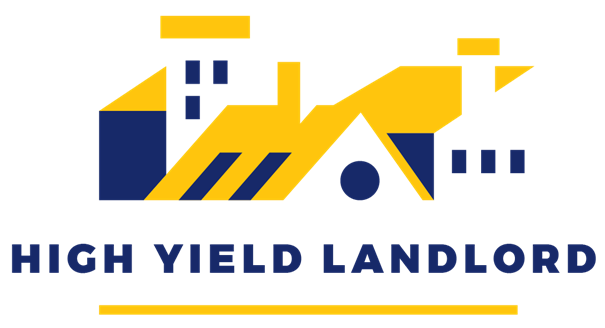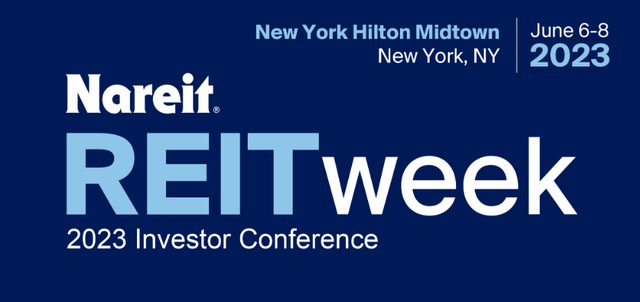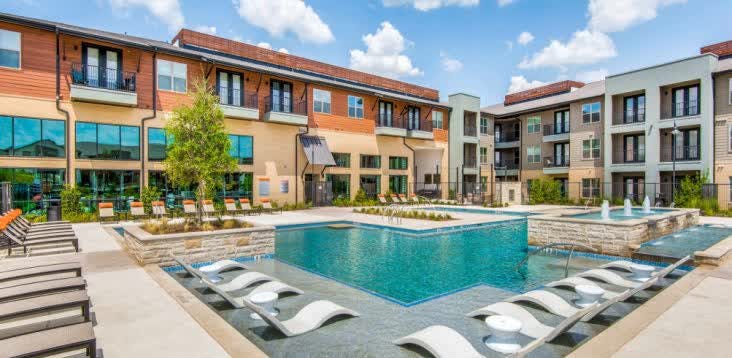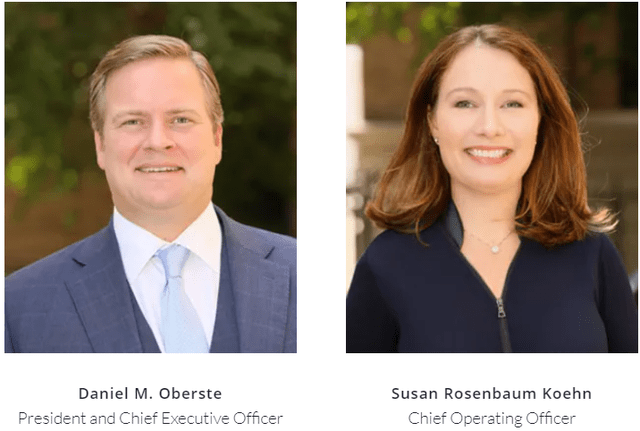Interview With BSR REIT
Please note that this is a free article of High Yield Landlord. If you find it valuable, consider joining our service for a 2-week free trial. You'll gain immediate access to my entire REIT portfolio, real-time trade alerts, exclusive REIT CEO interviews, and much more.
Interview With BSR REIT
I recently attended the NAREIT REITweek conference in NYC and got to meet with many REIT management teams. This includes BSR REIT (HOM.U / BSRTF), which is our largest apartment REIT investment.
We invest so heavily in it because:
It owns class B garden-style apartment communities in rapidly growing Texan markets. The majority of its portfolio is located in the famous Texan Triangle - Dallas, Austin, and Houston - which enjoys attractive long-term growth prospects.
Its rents are today still affordable at less than $1,500 per month and represent just about 25% of its resident's income, which is 2x less than the average in gateway markets. BSR's rents are still growing at a good pace and they are guiding to grow their same property NOI by 7% in 2023.
The company has a strong balance sheet with a 35% LTV and no debt maturities in 2023, limiting the impact of rising interest rates.
The company is also very well aligned with the management owning about 40% of the equity and insiders continue to buy more shares with their personal money.
As of right now, they are priced at a 45% discount to their net asset value. Their net asset value is based on real market transactions since they follow IFRS accounting rules. Based on their cash flow, they are priced at a 7.7% FFO yield. They pay out about half in dividends and retain the rest for share buybacks, which are very accretive for shareholders at these levels.
The biggest near-term risk is oversupply. A lot of new development projects are underway in the Texan Triangle, but we feel comfortable with this risk because the competing new supply is a lot more expensive than what BSR is offering. It could lead to some bumpiness in the near term, but the long-term prospects are very compelling because the surge in construction costs and interest rates will put a halt on new development projects, and rents are likely to keep growing a lot higher in the long run as demand continues to rise at a rapid pace and the ratios of rents-to-income surge closer to national averages.
I got to sit down with the company's CEO, Daniel M. Oberste, and COO, Susan Rosenbaum Koehn, for a good 45 minutes to talk about various topics, and below, I share all my main takeaways and conclusions.
My Takeaways From The Interview:
The CEO initiated the conversion by handing me over the NAREIT presentation deck of Mid-America Communities (MAA), which is one of their close peers. MAA also focuses on rapidly growing sunbelt markets, but it is a lot bigger and better known than them. As a result, it tends to trade at a somewhat higher valuation than BSR, but it is actually underperforming BSR on most fronts and they think that their small size and focus on Texas will allow them to keep on outperforming in the future.
I countered them by explaining that the market might be rewarding MAA with a higher valuation because it is giving value to their development platform, which yields them greater returns than property acquisitions would. I liked their response to this. They said that they don't need to develop new properties today because they can earn comparable or better returns by simply buying back their stock. Today, the implied cap rate of its shares is about 6.5% and buybacks are a lot safer than developing new properties. Moreover, today, development projects face growing oversupply risk and REITs like MAA will have to keep paying salaries to their development teams, even if these projects become less rewarding. BSR can just keep buying back shares as long as they remain so heavily discounted. They argue that this offers better risk-to-reward and I agree.
But they are not against developing new properties. They have one project underway in Austin and it is a JV with another developer that needed the capital. This project is today costing them money and somewhat understating their FFO. I don't remember the exact figure, but I believe that the CEO said that as they lease up the property, it should grow their FFO per share by about $0.04. That's about 5% growth from a single property. In the future, they expect to do more of such JVs with the region's best developers, but they seemed reluctant to build their own development platform at this point. They seem to believe that such JV partnerships offer the best risk-to-reward in their case because they are fairly small in size, these JVs offer more flexibility, allow them to cherry-pick the best projects with the best developers, and avoid having to hire a bunch of people, which has a big indirect cost, especially for a company of their size.
We then got back to their valuation as I wanted to test the assumptions that they are using to come up with their net asset value of $20.50 per share. They explain that cap rates remain in the 4.25 - 4.75% range for the assets that they are transacting in the market. This is up only slightly from a year ago. They have also slightly adjusted upward their cap rate, which is now 4.7%. Important to note is that they also have a near 10% mark-to-market in their leases so the normalized forward cap rate that they are using is today closer to 5%. So they think that their valuation assumptions are very reasonable. You just don't find such assets for sale in these markets at a >5% cap rate, even despite the surge in interest rates. Investors still want to buy these assets because they understand the long-term growth opportunity.
Their current share price is just $11 per share, resulting in a 45% discount to NAV. The implied cap rate is about 6.7% at the current share price. If you take into account the near 10% mark-to-market in rents, then the implied cap rate is closer to 7% based on their normalized forward NOI. You would never get even close to such cap rates in the private market and so this is why they have turned their focus to share buybacks. The CEO made this funny comment that if they were a private company and offered to buy out their partner at 60 cents on the dollar, the partner would probably pull out their gun and point it at them because it would be so unreasonable. Yet, because they are public, they are today able to buy out their partners at 55 cents on the dollar. They seem prepared to keep buying back shares for a long time to come and seem quite happy about the opportunity to do so. They are the biggest shareholders and know that this will create a lot of value for them in the long run.
We then turned the discussion to what else they could do to close this valuation discount and unlock value for shareholders. One potential catalyst would be to seek a primary listing in the US. They explain that they are today primarily listed in Canada, but they may change that in the future. Back when they sought a listing, Canada made sense for them because it was a lot cheaper and easier for a small company. But the downside is that Canadian investors are not as knowledgeable about BSR's markets and so this may be one reason why they persistently trade at a discount, when in reality, all else held equal, they would probably deserve to trade at a premium relative to their peers. They explain that they are in no rush to change their listing, but if the discount remains persistent, they will consider changing it in the future.
They are open to M&A. If someone was willing to pay a fair price for their portfolio, they would consider selling the whole company. After all, they own $100s of millions worth of shares themselves. He explains that they could simply take the proceeds, lock a big gain, and start all over again with another vehicle. But as of right now, they doubt that such a deal would maximize value for long-term-oriented investors. A potential buyer would likely want a discount, and even if the discount was smaller than what they currently trade at, it may not make sense to sell such attractive long-term investments since time is on their side. Better times will again eventually return and value is typically maximized in M&A transactions when the sentiment is more bullish.
They don't seem interested in selling individual assets to accelerate buybacks. They put a lot of work into building this unique portfolio and selling off individual assets would result in various costs/taxes. They would rather increase the leverage if they decided to accelerate buybacks, but as of right now, they like their current approach of maintaining a strong balance sheet, collecting growing rents, and buying back shares as the cash flow comes in.
They believe that their small size is a big advantage when compared to other apartment REITs like AvalonBay. Over the past few years, they were able to reposition their portfolio to Texan markets it paid off handsomely. It is not the first time that they have completed such portfolio repositionings. An apartment REIT like AvalonBay couldn't do that because they are just too big.
A big catalyst that no one seems to be paying attention to is a potential cut in property taxes in Texas. Just about 10 days ago, Governor Greg Abbott and House Speaker Dade Phelan backed a plan to spread property tax relief. The state has a $32.7 billion surplus at its disposal and the plan is to throw a lot of it into property tax relief. It seems very uncertain exactly how big of a cut this is going to be, but the CEO seemed confident that they will enjoy a cut. In a best-case scenario, this could be a big catalyst that results in even higher immediate FFO per share. But even a small cut would benefit them indirectly in the long run as it would send the message that Texas is tax-friendly and attract even more businesses into these markets.
My Conclusion
I think that our investment in BSR is in good hands.
The management is focused on maximizing long-term shareholder value because they own a big chunk of the equity.
They are not just talking about the discount. They are actually taking steps to take advantage of it with buybacks.
This seems like a clear case of the market only focusing on near-term risks and forgetting about the bigger picture: you get to buy high-quality Texan apartment communities with strong long-term organic growth prospects at 60 cents on the dollar with good management and conservative leverage.
Are there risks? Sure. Supply is coming in, rent growth could temporarily slow down in 2024, cap rates could expand a bit, etc.
But real estate should be valued based on decades of expected cash flow and that's why repricing the company at a 6.5-7% implied cap rate makes little sense.
We made a lot of money with BSR by buying it in 2021 when it was discounted. It has since then dropped back down, offering us an opportunity to buy more shares, and we expect to profit again in the coming years as its valuation recovers.
Finally, please note that this is a free article from High Yield Landlord. If you found it valuable, consider joining our service for a 2-week free trial. You'll gain immediate access to my entire REIT portfolio, real-time trade alerts, exclusive REIT CEO interviews, and much more. We are the largest and highest-rated REIT investment newsletter online, with over 2,000 paid members and more than 500 five-star reviews.
We spend 1000s of hours and over $100,000 per year researching the market for the most profitable investment opportunities and share the results with you at a tiny fraction of the cost.
Get started today - the first 2 weeks are on us:
Sincerely,
Jussi Askola
Analyst's Disclosure: I/we have a beneficial long position in the shares of all companies held in the CORE PORTFOLIO, RETIREMENT PORTFOLIO, and INTERNATIONAL PORTFOLIO either through stock ownership, options, or other derivatives. High Yield Landlord® ('HYL') is managed by Leonberg Research, a subsidiary of Leonberg Capital. All rights are reserved. No recommendation or advice is being given as to whether any investment is suitable for a particular investor. The newsletter is impersonal and subscribers/readers should not make any investment decision without conducting their own due diligence, and consulting their financial advisor about their specific situation. The information is obtained from sources believed to be reliable, but its accuracy cannot be guaranteed. The opinions expressed are those of the publisher and are subject to change without notice. We are a team of five analysts, each contributing distinct perspectives. Nonetheless, Jussi Askola, the leader of the service, is responsible for making the final investment decisions and overseeing the portfolio. We do not always agree with each other and an investment by Jussi should not be taken as an endorsement by other authors. Past performance is no guarantee of future results. Our portfolio performance data is provided by Interactive Brokers and believed to be accurate but its accuracy has not been audited and cannot be guaranteed. Our portfolio may not be perfectly comparable to the relevant index. It is more concentrated and may at times use margin and/or invest in companies that are not typically included in REIT indexes. Finally, High Yield Landlord is not a licensed securities dealer, broker, US investment adviser, or investment bank. We simply share research on the REIT sector.










